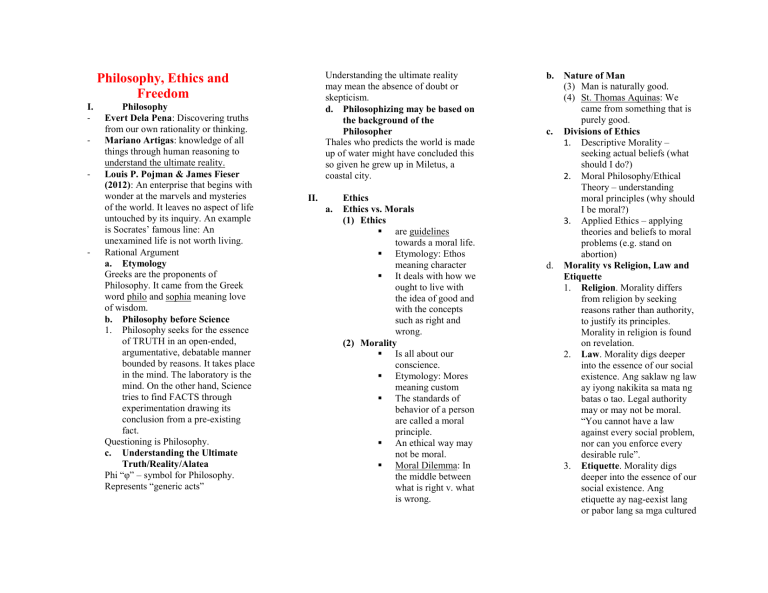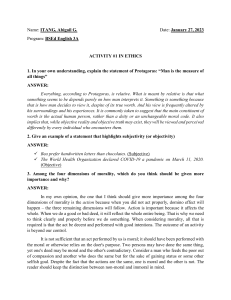
Understanding the ultimate reality may mean the absence of doubt or skepticism. d. Philosophizing may be based on the background of the Philosopher Thales who predicts the world is made up of water might have concluded this so given he grew up in Miletus, a coastal city. Philosophy, Ethics and Freedom I. - - - Philosophy Evert Dela Pena: Discovering truths from our own rationality or thinking. Mariano Artigas: knowledge of all things through human reasoning to understand the ultimate reality. Louis P. Pojman & James Fieser (2012): An enterprise that begins with wonder at the marvels and mysteries of the world. It leaves no aspect of life untouched by its inquiry. An example is Socrates’ famous line: An unexamined life is not worth living. Rational Argument a. Etymology Greeks are the proponents of Philosophy. It came from the Greek word philo and sophia meaning love of wisdom. b. Philosophy before Science 1. Philosophy seeks for the essence of TRUTH in an open-ended, argumentative, debatable manner bounded by reasons. It takes place in the mind. The laboratory is the mind. On the other hand, Science tries to find FACTS through experimentation drawing its conclusion from a pre-existing fact. Questioning is Philosophy. c. Understanding the Ultimate Truth/Reality/Alatea Phi “φ” – symbol for Philosophy. Represents “generic acts” II. a. Ethics Ethics vs. Morals (1) Ethics are guidelines towards a moral life. Etymology: Ethos meaning character It deals with how we ought to live with the idea of good and with the concepts such as right and wrong. (2) Morality Is all about our conscience. Etymology: Mores meaning custom The standards of behavior of a person are called a moral principle. An ethical way may not be moral. Moral Dilemma: In the middle between what is right v. what is wrong. b. c. d. Nature of Man (3) Man is naturally good. (4) St. Thomas Aquinas: We came from something that is purely good. Divisions of Ethics 1. Descriptive Morality – seeking actual beliefs (what should I do?) 2. Moral Philosophy/Ethical Theory – understanding moral principles (why should I be moral?) 3. Applied Ethics – applying theories and beliefs to moral problems (e.g. stand on abortion) Morality vs Religion, Law and Etiquette 1. Religion. Morality differs from religion by seeking reasons rather than authority, to justify its principles. Morality in religion is found on revelation. 2. Law. Morality digs deeper into the essence of our social existence. Ang saklaw ng law ay iyong nakikita sa mata ng batas o tao. Legal authority may or may not be moral. “You cannot have a law against every social problem, nor can you enforce every desirable rule”. 3. Etiquette. Morality digs deeper into the essence of our social existence. Ang etiquette ay nag-eexist lang or pabor lang sa mga cultured e. f. or brought up sa ganoong klaseng gawi. Following the etiquette is just a polite behavior. Morality is a right behavior. “Etiquette doesn’t get to the heart of what is vitally important for personal and social existence”. Moral Principles 1. Prescriptivity. Moral advises and influences action. 2. Universalizability. Moral applies to all people who are in a relevant similar situation (e.g. Golden Rule) 3. Consistency. One sticks to his/her moral judgment or value judgment (Could I will that everyone acts according to this principle?) *In relation to Universalizability 4. Overridingness. Moral has predominant authority. (e.g. When the law becomes immoral, it is my moral duty to practice disobedience) 5. Publicity. Morals must be public to prescribe behavior. 6. Practicability. Morals are workable and not too idealistic. Its rules may not lay a heavy burden on us. Ethical Assessment 1. Action (Permissable and Not Permissable Acts) Permissable are right acts. They may be obligatory or optional. Obligatory acts are what your morality REQUIRES you to do so (e.g. reviewing for a test) Optional acts are meh. Doing it or not doing it just gives you the same level of satisfaction. Examples are supererogatory acts or beyond the call of duty (ipapahamak ang sarili). Not permissible are wrong acts. Inherent Duty (Deontology). E.g. “never breaking a promise” 2. Consequences Weighing down the justice Utilitarianism by Jeremy Bentham 3. Character Virtues and Vices 4. Motive Intentions. III. Freedom vs. Free-doom Freedom is doing what is in your nature. To achieve freedom, one must stay true to oneself. Free-doom is going beyond your true self. St. Augustine of Hippo: There’s no evil in this world. Free will is the cause of evil. Martin Heidegger: Freedom is only to be found where there is burden to be shouldered. Freeing yourself to be who you are no matter who you are. Free yourself from the fear of others knowing who you are and respecting yourself for who you are. Know your nature for you to be free. IV. Other Information a. Moral Subjectivism – Bongbong (respect of opinion) b. Objective Relativism – Leni (receipt of facts) Everything is empty – Jean Paul Sartre Principle of Contradiction (Metaphysics) “Bakit maasim ang Sampaloc” Answer: Maasim kasi alam mong may matamis. Main Reference: Pojman, L. P., & Fieser, J. (2011). Cengage Advantage Books: Ethics: Discovering Right and Wrong. Cengage Learning Ethical Relativism - “Respect for individuals entails respect for their culture. Understand cultural diversity.” I. - - II. - III. - - Definition The doctrine that the moral rightness and wrongness of actions vary from society to society and there are no absolute moral standards binding on all men at all times. (John Ladd) It debunks ethnocentrism. The idea that all of reality is on the lens of one’s own cultural beliefs and values. (Example: Western values being imposed to African tribes. Note: It is also equivalent to sexism/racism. So, today we condemn ethnocentric and moral objectivistic views. Moral objectivism is the idea that there are universal and moral objective principles applicable to all of humankind) Nihilism vs. Relativism Nihilism: No valid moral principles exist; morality is only fiction. Relativism: Morality is justified by either the individual’s subjective virtue or conventional/cultural virtue. Subjective Ethical Relativism Morality depends on the individual It is in the eye of the beholder Taste or Aesthetic judgments = Lack of inhibition Notions of good/bad and right/wrong cease to have interpersonal evaluative meaning. Questions raised: IV. - - - (1) What do you feel right after? (2) Are you fine about it? (3) Who are you to judge? Limitations: a. If followed, morality would have a minimal aim of preventing a Hobbesian state of nature where people are barbaric and brutish. b. Strengthen moral solipsism. Isolated individuals make up separate universes. HOWEVER, NO MAN IS AN ISLAND. c. It is possible that our view of personality (in a subjectivist pov) might contradict to our familial and communal/societal values. d. It comes from a vacuum. Conventional Ethical Relativism (CER) Conventionalism All moral principles are valid relative to the culture. Recognizing the importance of our social environment in generating customs and beliefs is the achievement of ethical relativism. TWO THESES (exposed by John Ladd): a. Diversity Thesis: morality varies from one society to another. Hence, it is important to understand cultural relativism. b. Dependency Thesis: morality of a person depends on the society or culture he or she belongs to. Trying to see things from an independent, noncultural pov would be like taking out our eyes to examine their contours and qualities. In short, we need the perspective of others to build a view of the “great arc” of human potentials. Morality is a product of social history. V. CER Part I: Advertising the Value of Tolerance “Sometimes, people need to master the art of not giving a fuck” – Harvey (2023) Melville Herskovits’ Intercultural Tolerance: (1) Morality is relative to its culture (2) If morality is relative to its culture, then there is no independent basis for criticizing the morality of any other culture but one’s own. (3) If there is no independent way of criticizing any other culture, then we ought to be tolerant of the moralities of other cultures. (4) Therefore, we ought to be tolerant of the moralities of other cultures. However, it is also important to note that the principle of tolerance must not be absolute. For an act should cease to be moral once the group of people who performs it also not tolerate it. The act in question, therefore, should be condemned. (???) VI. Criticism or Limitations of CER a. Undermines important values (1) We cannot legitimately criticize anyone who espouses what we might regard as heinous principles/restricts moral criticisms. (e.g., genocide may be as moral as their opposites) b. - - c. - d. - (2) Going against dominant cultural standards is deemed wrong. Truth is with the crowd and error with the individual. (3) Neither law nor civil disobedience has a firm foundation. Why should I obey a law that my group doesn’t recognize as valid? Leads to Subjectivism If a person belongs to multiple societies with conflicting moralities, then that person must be judged both wrong and not wrong whatever he/she does. Morality has the possibility to lose its action-guiding function. Choosing a subculture to depend on may lead to counterintuitive results. It does not justify what you did, it just leads to your subjectivistic principle. (Re: Slippery Slope. A fallacy of objecting to a proposition on the erroneous grounds that, if accepted, it will lead to a chain of events that are absurd or unacceptable) Exaggerates Moral Diversity CER exposes cultural diversity. If cultural diversity constitutes to many societies with radically different moral codes, then, to concede a complete cultural relativism, establishing a neutral stand or objectivism is needed to defend a form of universalism. Has weak dependency Application of moral principles depends on particular cultural predicament. - VII. - - We differ ONLY in beliefs, not in substantive moral principles. Nonmoral factors debate on the facts of the matter. Therefore, relativist is limited in maintaining the stronger dependency where validity of the principles is a product of the culture and that different cultures will invent different valid principles. Indeterminacy of Language or Translation Theory by Willard V. Quine states that language are often so fundamentally different from each other that we cannot accurately translate concepts from one to another. (e.g. the use of words semantically, it may mean literally but also figuratively) Language molds moral principles. Limitation: (1) it is found that EXPERIENCE molds morality. General moral principles constitute to a common human experience which are then communicated transculturally. Thus, The Indeterminacy of Language should be relativized to objective morality.




